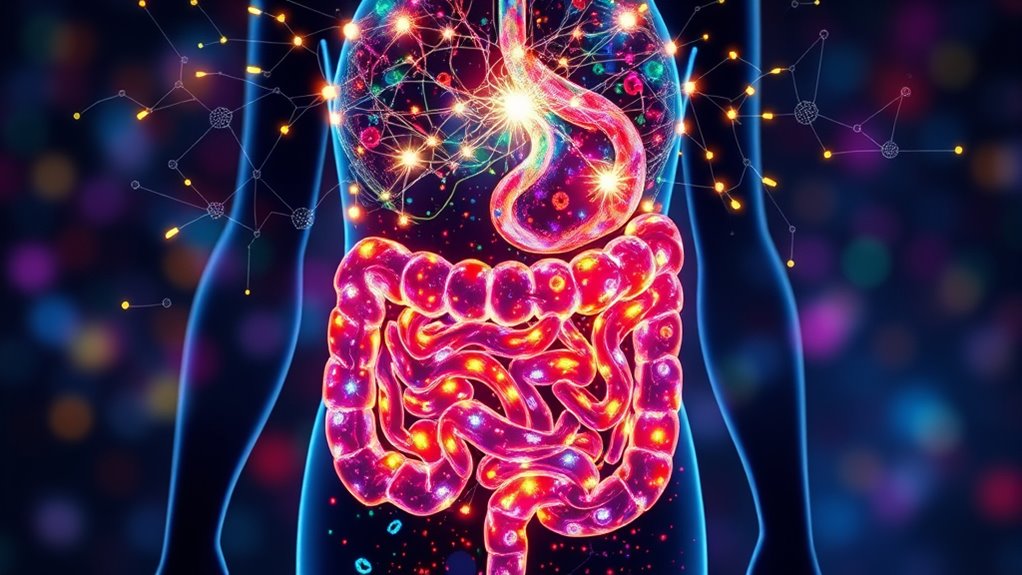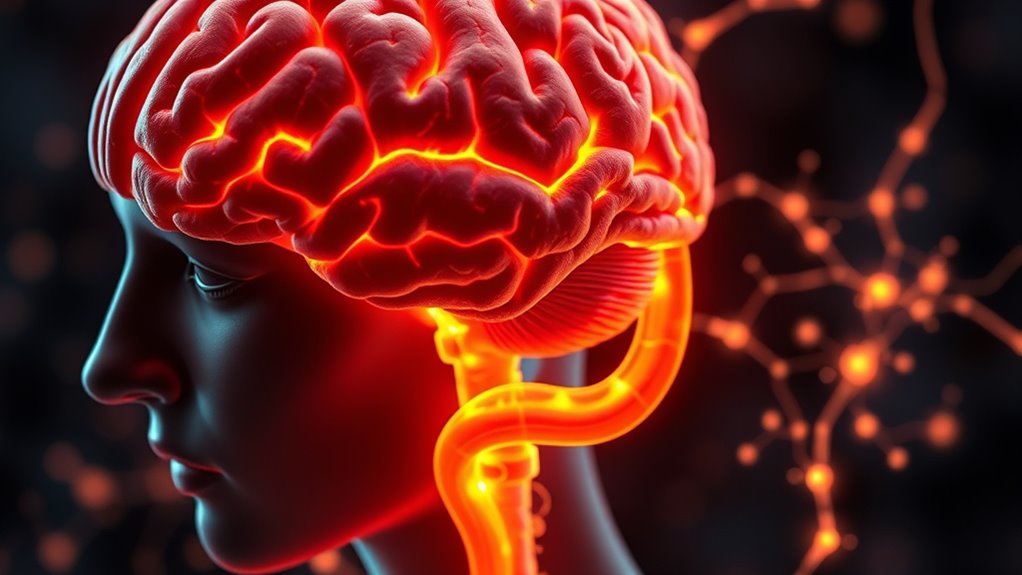The microbiome-gut-brain axis is a complex communication system connecting your gut bacteria to your mental health. Your gut microbiome influences mood, behavior, and cognition by producing neurotransmitters like serotonin and GABA, and signaling through the vagus nerve. Eating a diet rich in fiber, fermented foods, and diverse nutrients supports beneficial microbes and reduces inflammation. If you want to explore how your diet shapes this powerful connection, you’re about to discover more.
Key Takeaways
- The microbiome-gut-brain axis is a communication network linking gut bacteria to brain function and mental health.
- Diet influences this axis by promoting beneficial microbes that produce mood-related neurotransmitters like serotonin and GABA.
- Neural pathways such as the vagus nerve transmit signals from the gut to the brain, modulated by microbiota activity.
- Gut microbial composition affects neurochemical production, impacting cognition, emotional stability, and susceptibility to mental health issues.
- Supporting a healthy microbiome through diet can reduce inflammation and improve mental well-being.

The microbiome-gut-brain axis is a complex communication network linking your gut microbiota to your brain, influencing mood, behavior, and overall mental health. This connection isn’t just a vague idea; scientific research shows that what you eat can profoundly impact this axis. Dietary influences play an essential role in shaping your gut microbiome, which in turn affects how signals are transmitted through neurological pathways to your brain. When your diet is rich in fiber, fermented foods, and diverse nutrients, you promote the growth of beneficial bacteria that produce neurotransmitters like serotonin and GABA, vital for mood regulation. Conversely, a diet high in processed foods and sugars can disrupt this balance, leading to an imbalance in neurotransmitter production and potentially contributing to anxiety or depression.
Your gut microbiota communicates with your brain via several neurological pathways, including the vagus nerve, immune system signaling, and the production of neuroactive compounds. The vagus nerve acts as a direct highway, transmitting signals from your gut to your brain, often modulated by the bacteria residing there. When beneficial microbes produce short-chain fatty acids or neurotransmitters, these substances can influence brain function by activating neural pathways or crossing the blood-brain barrier. Immune system signaling also plays a role; an unhealthy microbiome can promote inflammation, which is linked to mental health issues like depression. Dietary choices that support gut health help maintain a balanced immune response, reducing inflammation and supporting better mental well-being. Additionally, research indicates that the composition of gut microbiota can significantly impact neurochemical production and cognitive processes.
Gut-brain communication involves the vagus nerve, immune signals, and neuroactive compounds influencing mental health.
Understanding the neurological pathways involved emphasizes how interconnected your diet and mental health truly are. For example, consuming probiotics and prebiotics can enhance the diversity of gut bacteria, leading to increased production of mood-boosting chemicals. This, in turn, can improve cognitive function and emotional stability. Conversely, poor diet choices can impair these pathways, resulting in reduced communication efficiency between your gut and brain. It’s also worth noting that stress and lifestyle factors influence this axis, but the foundation remains rooted in your diet and its effect on microbiota composition.
In essence, the relationship between diet, gut microbiota, and your brain is a dynamic system where what you eat directly influences neurological pathways and, consequently, your mental health. Paying attention to your dietary habits allows you to support this intricate network, fostering better mood, sharper cognition, and overall mental resilience. The more you learn about these connections, the better equipped you’ll be to make choices that nurture your gut microbiome and, by extension, your brain’s health.
Frequently Asked Questions
Can Probiotics Improve Mental Health Through the Microbiome-Gut-Brain Axis?
You might wonder if probiotics can boost mental health. Certain probiotic strains have shown promise in supporting mental well-being by positively influencing your gut-brain axis. When you choose probiotics with specific strains, they can help balance your gut microbiome, potentially reducing anxiety and improving mood. While research continues, incorporating targeted probiotic strains into your routine could be a beneficial step toward enhancing your mental health naturally.
How Does Diet Influence the Microbiome-Gut-Brain Connection?
You might not realize it, but what you eat truly shapes your gut and brain connection. Consuming foods rich in dietary fibers fuels beneficial fermentation processes, fostering a healthy microbiome. This, in turn, supports better communication between your gut and brain. By choosing fiber-rich, fermented foods, you can enhance this essential axis, potentially boosting your mood and cognitive function naturally. Your diet’s influence is more powerful than you might think.
Are There Specific Microbiota Linked to Neurological Disorders?
You might wonder if specific microbiota are linked to neurological disorders. Research shows certain microbial biomarkers can influence gut-brain signaling, affecting brain function. For example, reduced levels of beneficial bacteria like Lactobacillus and Bifidobacterium are associated with conditions such as depression and anxiety. Identifying these microbial biomarkers helps us understand how gut bacteria impact neurological health, opening doors for targeted therapies to modulate gut-brain signaling.
What Role Does the Microbiome Play in Stress Response?
You might think stress is solely psychological, but the microbiome plays a vital role in your stress response. By fostering a healthy microbiome through diet and lifestyle, you can enhance stress resilience. Microbiome modulation influences brain chemistry, reducing anxiety and improving mood. Recognizing this connection empowers you to take active steps toward better mental health, showing how your gut health directly impacts your ability to handle stress effectively.
How Soon Can Gut Microbiome Changes Affect Mental Health?
You might notice rapid responses or immediate effects on your mental health after changes to your gut microbiome. Research suggests that within hours or days, shifts in microbiota can influence mood and stress levels. This quick impact occurs because your gut and brain communicate directly through neural and chemical pathways. So, altering your diet or taking probiotics could potentially lead to noticeable mental health improvements in a short time.
Conclusion
You now see how the microbiome, gut, and brain beautifully bind in a delicate dance of health. Recognizing this remarkable relationship reveals that nurturing your gut can nurture your mind, mood, and memory. By understanding this intricate interplay, you empower yourself to make mindful choices that may improve overall well-being. Remember, the more you learn about this dynamic duo, the more you can harness its harmony for a healthier, happier you.









